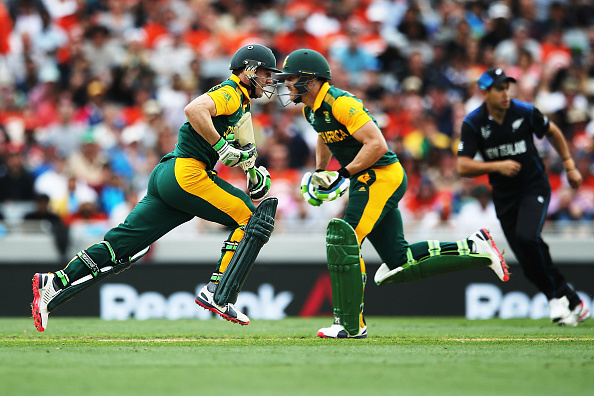New Zealand have been set an adjusted target of 298 in 43 overs in the World Cup semi-final match against South Africa at Eden Park.
While rain was always expected to influence this contest, the Proteas may lament the timing of a downpour at the end of 38th over. At that stage, South Africa looked to be on course for a total in excess of 320, but with the interruption, and subsequently the confirmation that the match would be reduced to 43-overs a side, they had to settle for 281-5 .
That being said, South Africa are still in a commanding position. New Zealand will chase an adjusted total of 298, a figure calculated via the Duckworth Lewis method. That rain break may have done little more than delay a likely outcome.
The Proteas’ final total doesn’t do their batting effort justice. They lost two early wickets, and it took no small measure of resolve for Faf du Plessis and Rilee Rossouw to absorb the pressure. De Villiers came to the crease in the 27th over, and proceeded to accelerate the run rate and bat his side into a powerful position.
For the most part, it was the New Zealanders who failed to cope with pressure. They may have started brilliantly, with Trent Boult taking two important wickets. There was a point when New Zealand were on top, and skipper Brendon McCullum went on the offensive with a field that included four slips and a gully.
The Auckland crowd obliged with vociferous support. It couldn’t have been easy for the Proteas to cope with the intensity in this Kiwi cauldron. Crucially, Du Plessis and Rossouw didn’t panic. They managed to stand their ground until the figurative storm passed.
Some might say that the Proteas were lucky, while others will argue that the Kiwis let themselves down. New Zealand certainly had their chances in the field, and will lament some strange decisions and poor catching.
While there was no matching De Villiers for innovation and aggression, Du Plessis played the game-shaping knock. The No 3 batsman showcased his temperament in those initial overs, and proceeded to guide South Africa out of trouble.
But things may have been different had Du Plessis received his marching orders when he was on 35. It was a big moment in the game, with the momentum starting to shift in the Proteas’ favour. Kane Williamson struck Du Plessis on the pads with a straight delivery, but his appeal for lbw was turned down. Television replays confirmed that had New Zealand asked for a review, they would have claimed this prize wicket.
Du Plessis and Rossouw put on 83 for the third wicket, and the departure of the latter did little to curb South Africa’s momentum or run of luck. De Villiers so nearly played the first ball he received back onto his own stumps.
The Proteas skipper took this in his stride, scoring at quicker than a run a ball. New Zealand started to feel the pressure in the field, and Williamson missed a big chance when he put down De Villiers on 38.
New Zealand had some luck at the end of the 38th over when rain stalled South Africa’s march towards a mammoth score. Two balls after play resumed, Corey Anderson got Du Plessis caught down the leg side.
De Villiers was relatively quiet in the final five overs of the South African innings. Fortunately for the Proteas, David Miller fired from the outset, and finished on 49 from 18 balls. It was Miller’s cameo that ensured South Africa added 65 runs in that period.
New Zealand boast a strong batting lineup, but they will struggle to chase down that adjusted target. At this point, the Proteas are hot favourites to advance to the World Cup final.
South Africa 281-5 in 43 overs (Faf du Plessis 82, AB de Villiers 65 not out, Corey Anderson 3-72, Trent Boult 2-53)
New Zealand need 298 to win in 43 overs (D/L method)







